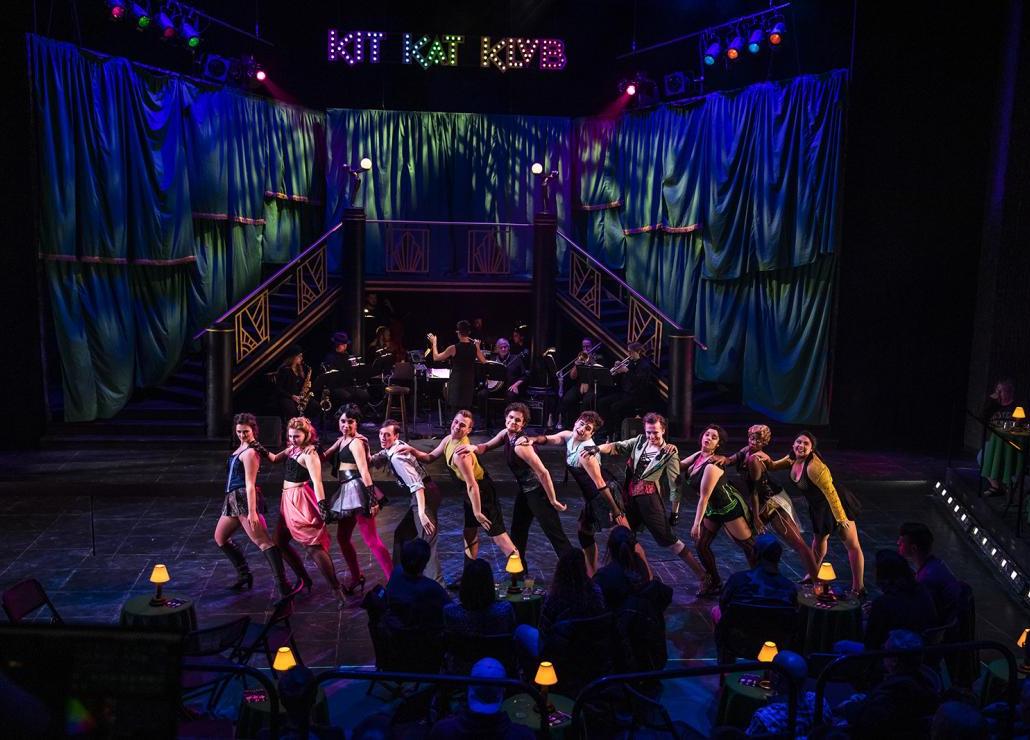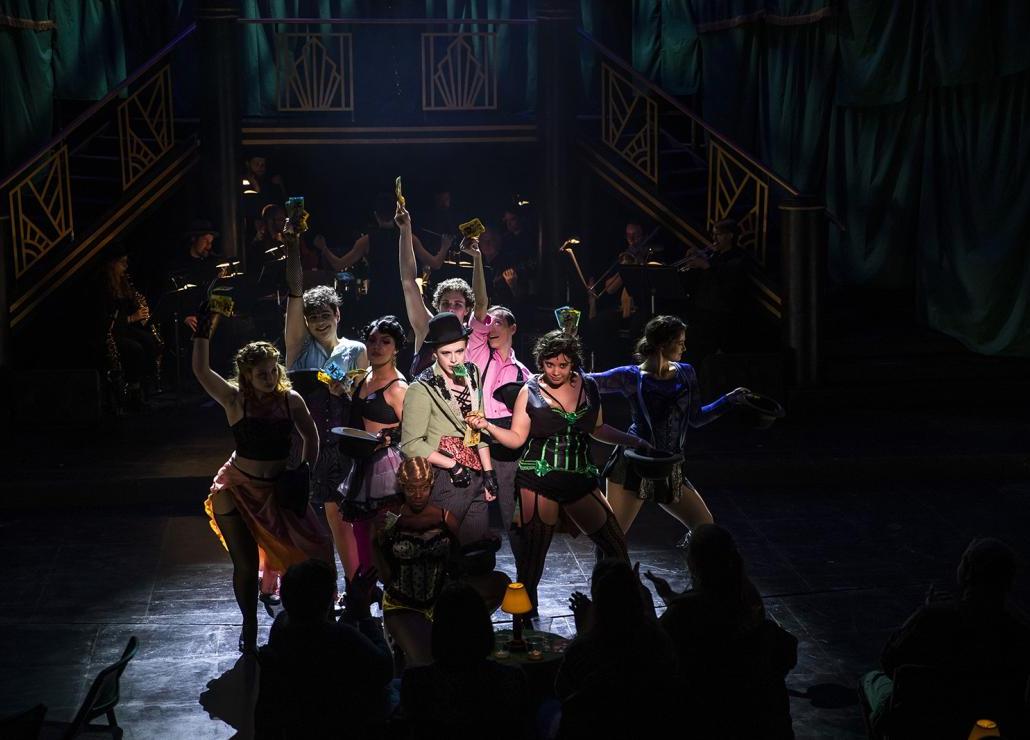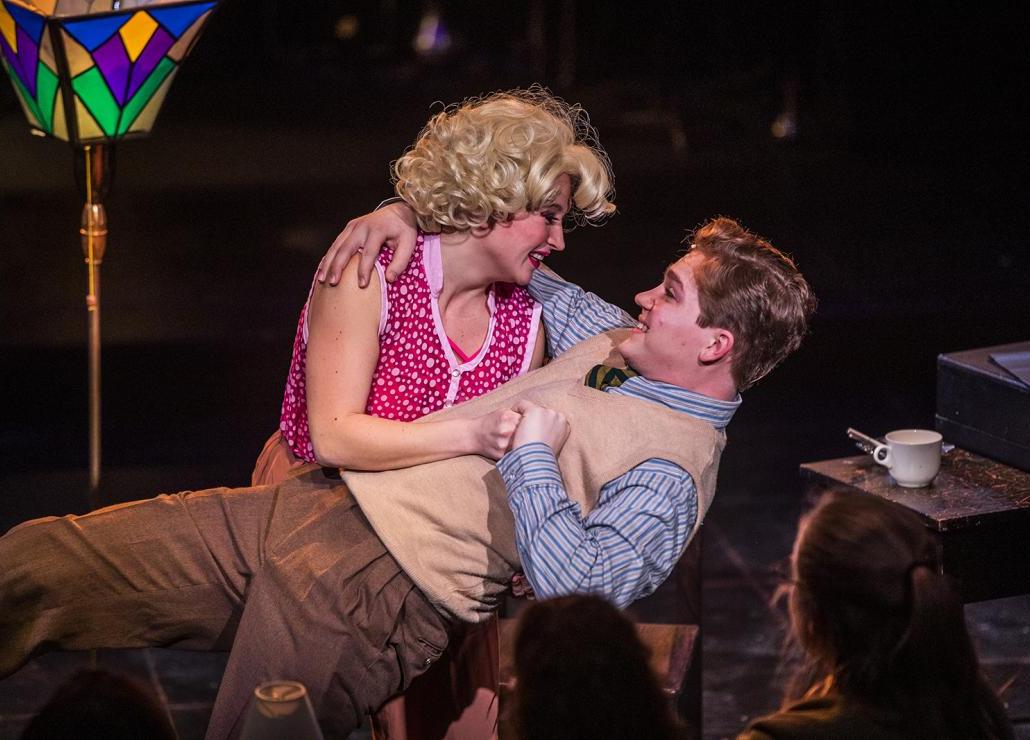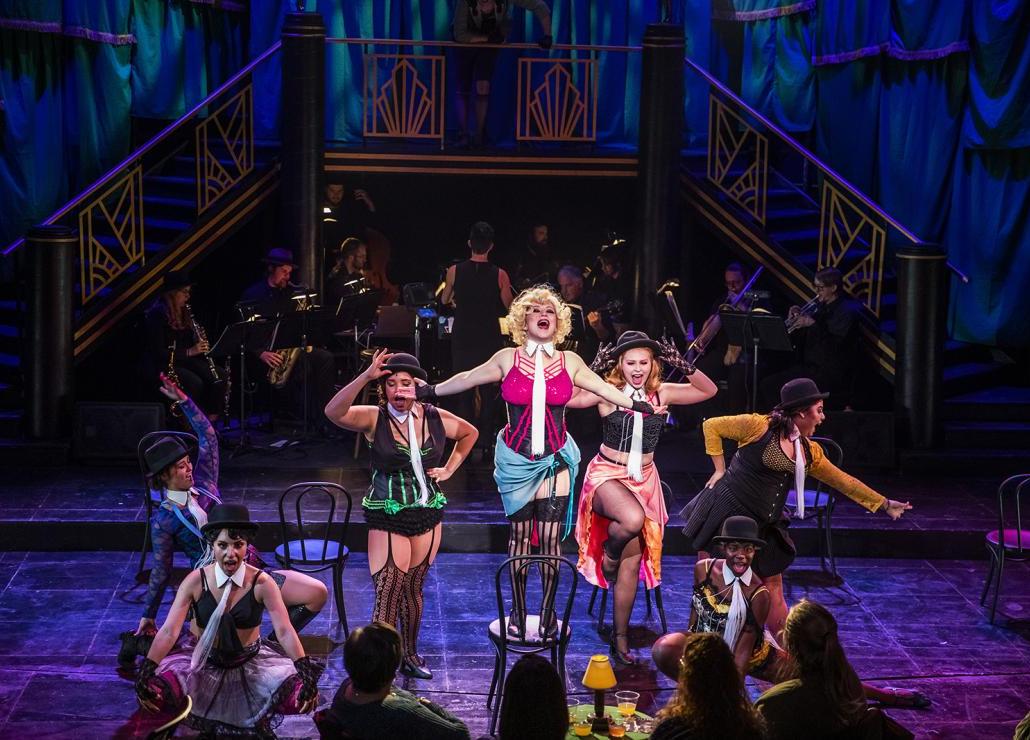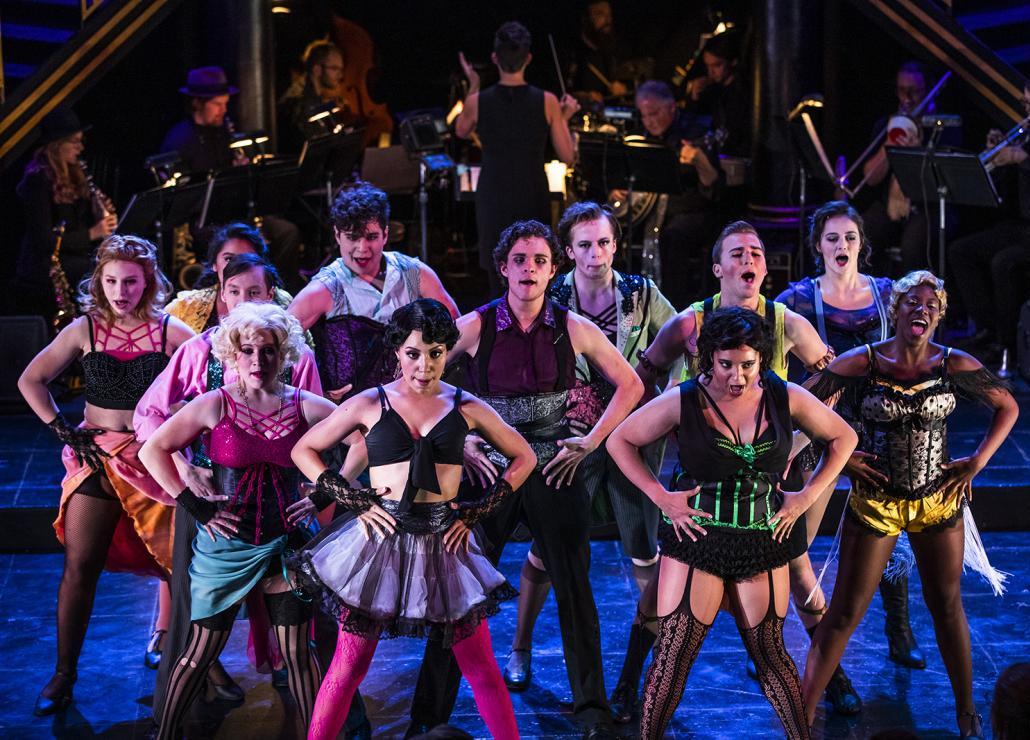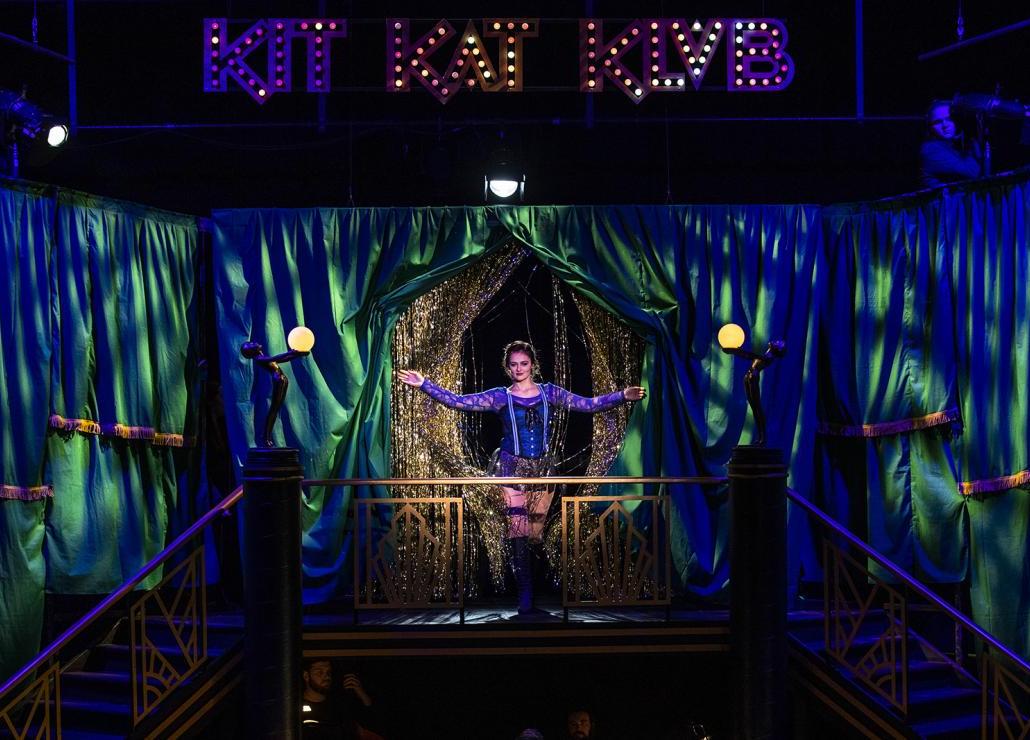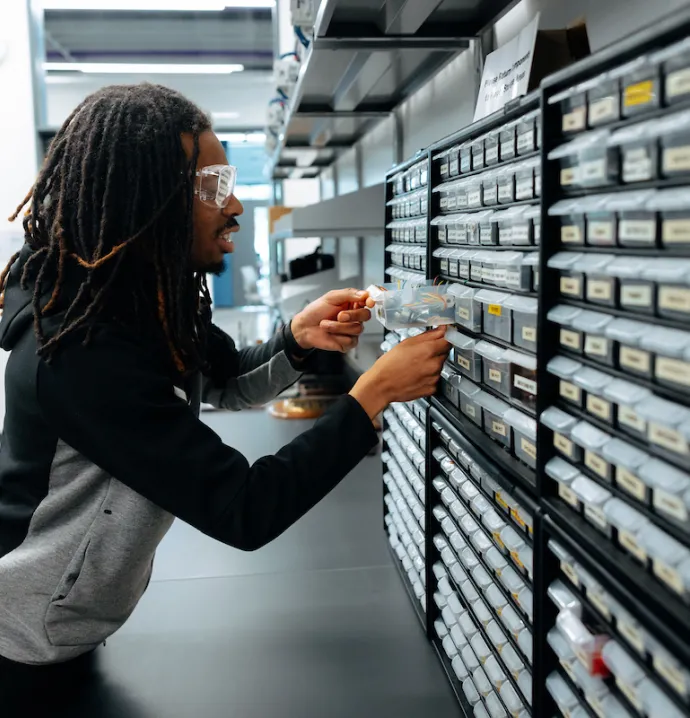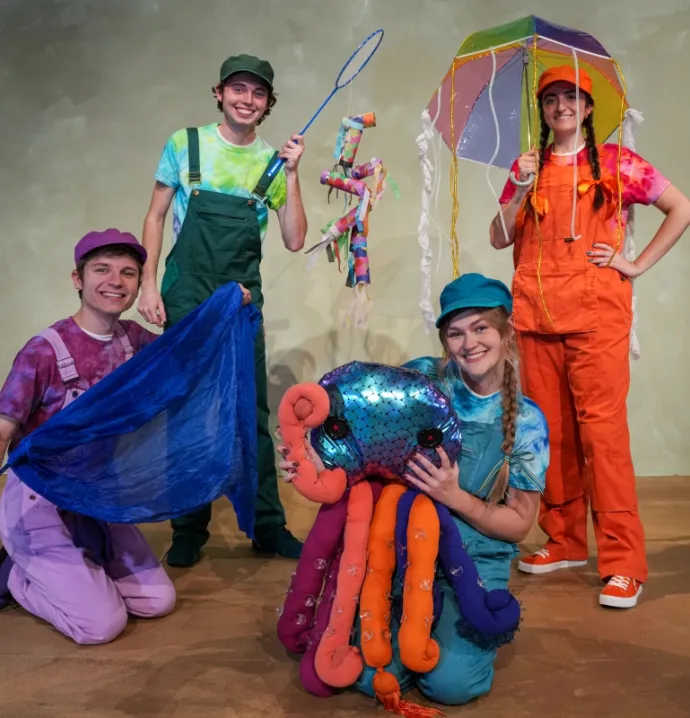Putting on a "Cabaret": Inside a Theatre UNI production
Putting on a "Cabaret": Inside a Theatre UNI production
Abby Chagolla slouched over in a chair in UNI Assistant Professor Amy Osatinski’s office, doodling in her binder, trying to find the right question for the answer she was desperately seeking. The senior theatre performance and communications studies double major was struggling to figure out her role in the upcoming Theatre UNI production of “Cabaret.” She hoped her meeting with Osatinski, director of this production of “Cabaret,” would help her find clarity. They’d been having a nice discussion, but nothing felt like the earth-shattering solution Chagolla needed to break the wall between her and her role.
Until — Osatinski raised her chin and her eyebrows and locked eyes with Chogalla, pausing before she spoke, the way people do when they know they’re about to say something important.
“Maybe he knows the secret,” Osatinski finally said.
The revelation sent Chagolla jumping out of her chair and waving her hands in celebration while shouting, “Yes, that’s it!”
“Cabaret” is a play that examines the rise of the Nazi party in 1920s Germany through the stories of performers and patrons in the fictional Kit Kat Klub in Berlin. Chagolla is playing a German woman trying to navigate a romantic relationship with a Jewish man in the face of fascism. As a Latina woman, it was difficult for Chagolla to connect with her role. But Osatinski helped her develop a backstory for her character that helped her identify with her character. And this latest insight — that her love interest knows her story — was just the breakthrough Chagolla needed to truly connect with her role.
Chagolla’s experience is just one example of the many struggles and triumphs that occur in the process of a typical Theatre UNI production. It’s a process that Osatinski is especially familiar with. She taught theater in various capacities for more than a decade before coming to UNI in fall 2017, and that experience allows her to help students through struggles like this.
“I’ve always been someone who just loves that analysis, and, for me, one of the things I love about theater is doing that sort of research and figuring out what makes things tick,” said Osatinski. “Each performer struggles in some way. It’s just part of the process. In my role as director, I have to figure out what an actor needs to get them where they need to go.”
This task is especially challenging for a play as politically charged as “Cabaret,” where some students have to take on emotional and polarizing roles, as holocaust survivors and Nazis. But that’s only part of the struggle — there are a number of other unique challenges with this production, as well as the normal demands that go along with any Theatre UNI production.
Learning through theatre
Theatre UNI helps students learn how to navigate these sort of struggles by giving them hands-on experience with the entire theatre process, from acting in a show to helping out behind the scenes. In addition to any acting roles they have, each student also has a hand in supporting other behind-the-scenes preparation, like set building and costume design, allowing them to build a diverse skill set.
“We get the opportunity not only to be cast in a mainstage role, but also be working construction crew and doing the wardrobe,” said Chagolla. “We get the whole educational experience, and we get to try roles that we normally wouldn’t be able to do.”
Students focusing on a specific area of behind-the-scenes work, like set design or costume design, also get to dip their toes in other areas, thanks to a diverse core curriculum that covers everything from costumes to lighting. They also learn a number of different techniques within their area of expertise. That’s especially true for “Cabaret,” which allows for some flashier costumes and more dramatic set pieces than some shows.
It’s something that excited Cheyenne Kay, a senior in theatre design and production with a costume emphasis. She’s worked with Theatre UNI for three years and applied skills she learned from other shows in exciting new ways. Most interestingly, she used the pleating method she first learned when creating a nun’s habit for Theatre UNI’s production of “Doubt” to create a sequin miniskirt for “Cabaret.”
“I’ve done something for every show every semester and being able to take those skills I learned and apply them here has been cool,” said Kay. “But I was really interested in playing with a different style than we usually do. It’s a cabaret, so it’s kind of gaudy, very big. I was interested to see how we were going to attack that and so far it’s been fun.”
Preparing for a Theatre UNI production is also a rigorous process. And “Cabaret” in particular is more work than even department faculty are used to. But, according to Jenn Sheshko-Wood, associate professor for Theatre UNI and costume designer for “Cabaret,” that’s what makes these productions valuable experiences for students.
“It’s more wigs than we usually do. It’s more things than we usually do,” said Sheshko-Wood. “But I feel like it’s appropriate for the show and pedagogically. It’s more work on the pre-end, but it makes the show run easier, and it’s a learning experience for students.”
Despite the fact that the department is working on producing a show, the show is not the focus. According to Osatinksi, theatre department faculty’s main concern is helping students gain the tools the need to succeed.
“Our primary focus really stresses process over product,” said Osatinski. “In education, there’s all this talk about real-world application, and that’s exactly what we do in the theater department. It’s giving them lots of tools and encouraging them to use them.”
A teachable moment
As a play exploring the rise of the Nazi party in Berlin, “Cabaret” illustrates many of the struggles people experience in the face of bigotry and political extremism, something Osatinski thought was relevant to our current political moment and could be a teachable moment for the audience. She points to the fable of the frog as the underlying message of the play — the tale of a frog that dies after being placed in a pot of tepid water while the heat is slowly turned to a boiling point.
This story captures not only the narrative of “Cabaret” itself — how the rhetoric of the Nazi party slowly worked its way through Germany — but also the creative choices Osatinski made to support that message. There will be subtle changes made to the set throughout the show, and she hopes they will help the audience not only feel engaged with the show, but also help them tune into the subtle changes happening in their daily lives during these tense political times.
“I’m Jewish, so this play is deeply personal. I feel like I’ve stepped back in time 20 years with what’s been happening over the last couple of years,” said Osatinkski. “I’m fortunate, working in educational theater, that you get a lot of support for things that have big messages. We saw Cabaret as a direct tie into what’s happening politically now. I want to be able to drive the point home — ‘Wake up!’”
“Cabaret” is playing at the Strayer-Wood Theatre through Friday, Dec. 8. For tickets, visit any UNITix location or unitix.uni.edu. A special lecture, exploring the real-life historical context of the play, will be held before the Dec. 7 show at 6 p.m. in Communication Arts Center, Room 108.


